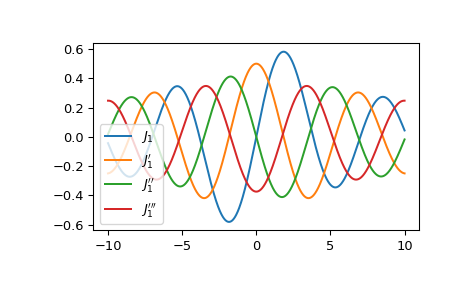jvp#
- scipy.special.jvp(v, z, n=1)[source]#
Compute derivatives of Bessel functions of the first kind.
Compute the nth derivative of the Bessel function Jv with respect to z.
- Parameters:
- varray_like or float
Order of Bessel function
- zcomplex
Argument at which to evaluate the derivative; can be real or complex.
- nint, default 1
Order of derivative. For 0 returns the Bessel function
jvitself.
- Returns:
- scalar or ndarray
Values of the derivative of the Bessel function.
Notes
The derivative is computed using the relation DLFM 10.6.7 [2].
References
[1]Zhang, Shanjie and Jin, Jianming. “Computation of Special Functions”, John Wiley and Sons, 1996, chapter 5. https://people.sc.fsu.edu/~jburkardt/f77_src/special_functions/special_functions.html
[2]NIST Digital Library of Mathematical Functions. https://dlmf.nist.gov/10.6.E7
Examples
Compute the Bessel function of the first kind of order 0 and its first two derivatives at 1.
>>> from scipy.special import jvp >>> jvp(0, 1, 0), jvp(0, 1, 1), jvp(0, 1, 2) (0.7651976865579666, -0.44005058574493355, -0.3251471008130331)
Compute the first derivative of the Bessel function of the first kind for several orders at 1 by providing an array for v.
>>> jvp([0, 1, 2], 1, 1) array([-0.44005059, 0.3251471 , 0.21024362])
Compute the first derivative of the Bessel function of the first kind of order 0 at several points by providing an array for z.
>>> import numpy as np >>> points = np.array([0., 1.5, 3.]) >>> jvp(0, points, 1) array([-0. , -0.55793651, -0.33905896])
Plot the Bessel function of the first kind of order 1 and its first three derivatives.
>>> import matplotlib.pyplot as plt >>> x = np.linspace(-10, 10, 1000) >>> fig, ax = plt.subplots() >>> ax.plot(x, jvp(1, x, 0), label=r"$J_1$") >>> ax.plot(x, jvp(1, x, 1), label=r"$J_1'$") >>> ax.plot(x, jvp(1, x, 2), label=r"$J_1''$") >>> ax.plot(x, jvp(1, x, 3), label=r"$J_1'''$") >>> plt.legend() >>> plt.show()
